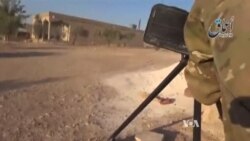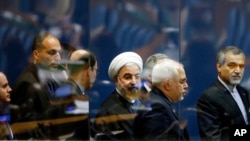Iranian President Hassan Rouhani says progress in ongoing nuclear talks with Western envoys has been "extremely slow" and warned that negotiations must speed up for a deal to be reached by a November 24 deadline.
His comments came a short while before top diplomats from the United States and the European Union opened a second day of talks on scaling back Iran's nuclear program in exchange for the gradual lifting of Western economic sanctions.
Western sources close to the talks also report little progress in the discussions.
Top diplomats from the United States, the European Union and Iran held a second day of talks Friday aimed at reaching a deal on Tehran's nuclear program.
U.S. Secretary of State John Kerry, Iranian Foreign Minister Javad Zarif, and EU foreign policy chief Catherine Ashton met Thursday in New York, where the U.N. General Assembly is being held.
A senior U.S. official told VOA the meetings would "take stock of the work that has been done this week and discuss the path forward."
Iran and six world powers (the U.S., Britain, France, Russia, China and Germany) face a November 24 deadline for agreeing to a deal to scale back Iran's nuclear program in exchange for reduced sanctions.
German Foreign Minister Frank-Walter Steinmeier said a solution to the nuclear issue "has never been closer in the past 10 years," though he warned the remaining work to be done "is probably the most difficult."
Steinmeier made his comments after meeting Thursday with Iranian President Hassan Rouhani, who told the U.N. General Assembly that Iran is determined to continue its nuclear program.
In his speech, President Rouhani also placed heavy blame on Western countries for the rise of extremism in the Middle East, citing colonialism and what he called "strategic blunders."
The Iranian leader said "moderate politicians and elites" in the region must provide the leadership to counter violence and terrorism.
Skepticism on Syria airstrikes
President Rouhani also expressed skepticism Friday that U.S.-led air strikes in Iraq and Syria could crush Islamic State militants.
Saying the violence of terrorist groups has nothing to do with Islam and that the flow of fighters, funding and other resources must be cut off to them, he questioned whether targeted airstrikes or even ground troops could accomplish that.
“I have my doubts about the Syria portion of these announcements," he said via translator. "What is the ultimate goal and objective of the aerial bombardments? What end game are they seeking?
“A serious fight and a serious engagement to eradicate terrorism must be initiated," he added. "[But] a cultural battle: prevention of financial resources being put at their disposal, prevention of equipment reaching their hands.”
Rouhani said all terrorism must be condemned, but also said he was “amazed” when a reporter asked if that included militants from the Iranian-supported Lebanese Shi'ite militant group Hezbollah or Palestinian Hamas fighters, groups he called legitimate resistance fighters.
The United States has designated both Hamas and Hezbollah as terrorist organizations.
VOA correspondent Margaret Besheer contributed to this report from New York. Some information for this report comes from AP and Reuters.













